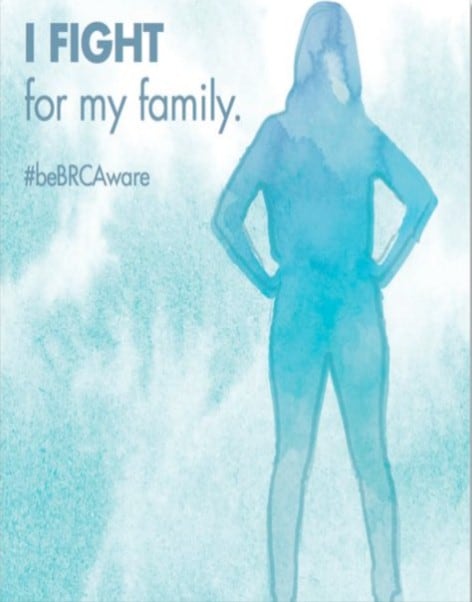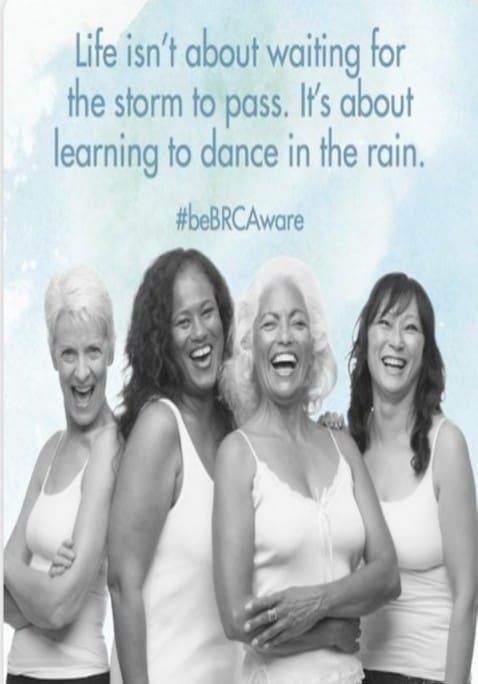I received $150 from AstraZeneca, and any opinions expressed by me are honest and reflect my actual experience. This is a sponsored post for SheSpeaks/AstraZeneca
It’s been almost 2 years since I lost my Godmother to Cancer. It’s been a hard long road. It’s been painful. I can’t help but think of all the things she’s missed out on since she left us. Sadly I’m not alone. Every time you turn around nowadays you find out someone else has cancer. Some cancers are aggressive yet some are becoming preventable or at least giving you a heads up to their possibility, thanks to new tests.
BRCA1 and BRCA2 are human genes involved with cell growth, cell division, and cell repair. Although they are most commonly associated with BReast CAncer, approximately 15% of women with ovarian cancer also have BRCA gene mutations.1,2
Thankfully there are some test to see if you are a carrier of that gene mutation. Sadly though there are a number of misperceptions about BRCA testing, such as the misperception that only those with a family history of breast or ovarian cancer or who are diagnosed at a young age should be tested. But, family history and age are poor predictors of BRCA status in ovarian cancer patients, which is why it is so important for all women with ovarian cancer to be tested.
- National guidelines from organizations such as NCCN, ASCO and SGO recommend that all patients with epithelial ovarian cancer be considered for BRCA testing, regardless of family history, age at diagnosis, or ethnicity3,4
- Approximately 15% of women with ovarian cancer have a deleterious BRCA mutation5
- Despite these guidelines, every year many patients with ovarian cancer are not tested for a BRCA1/2 mutation6,7
One of the reasons many patients are missed is the misperception that only those patients with a family history of breast or ovarian cancer or who are diagnosed at a young age should be tested.
But screening based on family history or age misses many ovarian cancer patients with a BRCA mutation:
- Family history and age at diagnosis are poor predictors of BRCA status in ovarian cancer patients8,9
- Almost half (47%) of BRCA-positive ovarian cancer patients have no significant family history of ovarian or breast cancer9
- Over two thirds (71%) of BRCA-positive ovarian cancer patients are aged 50 or older9
The test is simple and a blood or saliva sample can be taken at your physician’s office or at a local lab. In the United States, results are usually available in 2 to 3 weeks.BRCA status in ovarian cancer affects treatment outcomes, and there are treatment options available specifically for women with BRCA mutations. Personalized, or precision, medicine tailors treatment to a patient’s genetic profile, and with cancer it means doctors can target the specific mutations that they know drive a disease. This helps patients determine the right treatment options for them. For this reason, it is important for women with ovarian cancer to receive genetic testing so that they can plan with their doctor an individual treatment plan that is optimized for their specific cancer
The Realities of an Ovarian Cancer Diagnosis
For patients with advanced ovarian cancer who have had multiple lines of chemotherapy, the prognosis is poor and treatment options are progressively limited with each additional line of therapy. The American Cancer Society estimates that more than 21,000 new cases of ovarian cancer will be diagnosed in the Unites States in 2015, and that a woman’s risk of developing ovarian cancer is 1 in 73.For the 60% of ovarian cancer patients whose cancer has spread to other organs by the time of diagnosis, the five-year survival rate is only 27%.Ovarian cancer causes more deaths than any other cancer of the female reproductive system and is often diagnosed late because symptoms mirror everyday ailments.
Raise awareness with loved ones and talk to friends and family members about ovarian cancer and the importance of BRCA testing. I wish my Godmother would have taken this test and seen if she was carrier early on before it was too late. She taught me so much and there was still so much to learn from her. I guess the one lesson she leaves me is to be prepared and stay ahead of cancer because I’ve got my own little family that still needs me.
Stay connected and learn more about BRCA awareness
Website: myocjourney.com
Twitter: @beBRCAware
Facebook: https://www.facebook.com/pages/beBRCAware/250939935114040
YouTube: https://www.youtube.com/channel/UCmqqk6o8esolywblpF4-IKQ
References
1. Pal T, Permuth-Wey J, Betts JA, et al. BRCA1 and BRCA2 mutations account for a large proportion of ovarian carcinoma cases. Cancer. 2005;104(12):2807-2816.
2. National Cancer Institute. BRCA1 and BRCA2: Cancer risk and genetic testing. http://www.cancer.gov/cancertopics/factsheet/Risk/BRCA. Accessed June 2, 2014.
3. National Comprehensive Cancer Network. NCCN Clinical Practice Guidelines in Oncology: Genetic/Familial High-Risk Assessment: Breast and Ovarian. Version 1.2014.
4. Lu KH, Wood ME, Daniels M, et al; American Society of Clinical Oncology. American Society of Clinical Oncology Expert Statement: collection and use of a cancer family history for oncology providers. J Clin Oncol. 2014;32(8):833-840.
5. Pal T, Permuth-Wey J, Betts, et al. BRCA1 and BRCA2 mutations account for a large proportion of ovarian carcinoma cases. Cancer. 2005;104(12):2807-2816.
6. Myriad Genetics. http://www.myriadpro.com. Accessed November 18, 2014.
7. Meyer LA, Anderson ME, Lacour RA, et al. Evaluating women with ovarian cancer for BRCA1 and BRCA2 mutations: missed opportunities. Obstet Gynecol. 2010;115(5):945-952.
8. Song H, Cicek MS, Dicks E, et al. The contribution of deleterious germline mutations in BRCA1, BRCA2 and the mismatch repair genes to ovarian cancer in the population. Hum Mol Gen. 2014;(April 30):1-7.
9. Alsop K, Fereday S, Meldrum C, et al. BRCA mutation frequency and patterns of treatment response in BRCA mutation-positive women with ovarian cancer: a report from the Australian Ovarian Cancer Study Group. J Clin Oncol. 2012;30(21):2654-2663.


Comments & Reviews
If your pet is old, then go with a food specially formulated for that older
pet, that will have the nutritional supplements she needs, using a lower
ration of calories. This terrier is dignified, patient, loyal and intelligent and makes
a great companion dog that loves to have fun with children. If you are going to raise this puppy and teach it everything it knows, you might as well teach it where to go towards the bathroom
too.
Thank you for the information about this test. It’s definitely something I’m going to be looking into.
Thanks so much for the Very Informative review on Get BRCA Tested For Yourself & For Your Family! I’m sure this test costs a pretty penny! As most tests that are not required do. They should really make this a requirement for all women, no matter what their age or their history is! My husband’s Aunt died from ovarian cancer and she knew something was wrong but never went to find out what was bothering her. By the time she did, it was far too advanced for them to do anything for her. Thanks so much for sharing this very important information with all of us! This is the first time of hearing of this test and you are actually teaching all of us! Thanks again! Michele 🙂
I took the test as both mother and grandmother had breast cancer. It was a long road paying it off but I was glad I did it. But I still get mammograms every year. I have been since I was in my 30’s.
Don’t want it
What an easy test to do and I lost my great grandmother to ovarian cancer. Thank you for sharing and I am sorry about your loss.
I had no idea that this test was so easy!! I wish Iit was something that insurance contributed towards… Im sure its not super cheap!! My family has a history of both cancers and it would be a test I should probably get done! Thanks so much for sharing!! Your post could save lives!!
Thank you for the very informative post. Unfortunately, I know someone who’s passed away from ovarian cancer.